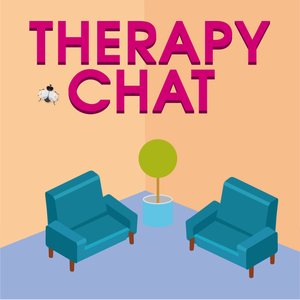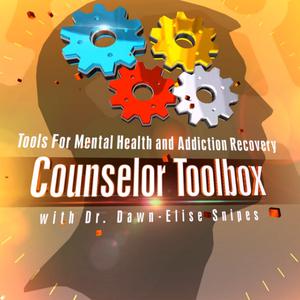
The Modern Therapist's Survival Guide with Curt Widhalm and Katie Vernoy
Katie Vernoy
Therapy Reimagined
- 38 minutes 37 secondsFrom Broadway to Grad School – Special Series Becoming a Therapist: An interview with Derek Isetti
From Broadway to Grad School – Special Series Becoming a Therapist: An interview with Derek Isetti
In this new series, Curt and Katie interview graduate students and will follow them on their journey to becoming a therapist. Our first interview is with Derek Isetti, a 50-year-old graduate student in a two-year Master of Social Work program at California State University, Stanislaus. Derek shares his journey from careers in musical theater and speech-language pathology to pursuing a career in therapy. He reflects on the challenges, surprises, and personal factors influencing his decision to return to school, offering insights into navigating graduate education and the mental health profession.
Transcripts for this episode will be available at mtsgpodcast.com!
An Interview with Derek Isetti
Derek Isetti, PhD, CCC-SLP earned his bachelor of arts in drama with an emphasis in musical theater from University of California, Irvine in 1996. After traveling the country in four national tours and performing in the musical Cabaret on Broadway, Derek returned to school and in 2008 he earned his master of science in Speech-Language Pathology from University of the Pacific. He later earned his doctor of philosophy in Speech and Hearing Sciences from University of Washington, studying voice disorders under the mentorship of Dr. Tanya Eadie. He joined the Pacific faculty in 2014 and is currently serving as Department Chair. In the Fall of 2023, he returned to school to pursue an MSW degree in hopes of becoming a psychotherapist. Derek is a member of the American Speech-Language-Hearing Association (ASHA) and the California Speech-Language-Hearing Association.
In this podcast episode, we meet Derek Isetti, an aspiring therapist
We are starting a new series to follow graduate students on their journey to become a therapist. We start with Derek Isetti, a third career therapist who is working full-time while attending a MSW program in Northern CA. (summary provided in collaboration with Otter.ai and ChatGPT)
The experience of transitioning careers to become a therapist
Derek explains his shift from a performer and speech-language pathologist to therapy, motivated by a desire to create supportive, transformative spaces for others.
What graduate school can be like for aspiring therapists
He details his MSW program structure, designed for working professionals, which includes online courses, in-person classes once a month, and 1,000 hours of fieldwork by graduation.
How therapy students can balance academic and personal life
Derek shares how his personal circumstances, being single, working in academia, and attending a state university for affordability—helped shape his path.
Some challenges and surprises on the path to becoming a therapist
He discusses the variability in program lengths (some social work programs are only 1 year, for example), California’s unique licensure process for social workers, and the tension between broad social work education and specialized psychotherapy training.
How current events and technology are addressed in therapy grad school
Derek highlights the integration of national events and teletherapy technology into his program and the importance of addressing these topics with clients and students.
Stay in Touch with Curt, Katie, and the whole Therapy Reimagined #TherapyMovement:
Our Linktree: https://linktr.ee/therapyreimagined
Modern Therapist’s Survival Guide Creative Credits:
Voice Over by DW McCann https://www.facebook.com/McCannDW/
Music by Crystal Grooms Mangano https://groomsymusic.com/
20 January 2025, 8:00 am - 40 minutes 37 secondsWhat if You Hate Private Practice?
What if you hate private practice?
Curt and Katie chat about the realities of private practice and why it isn’t the idyllic career path it’s often made out to be. We dig into reasons therapists may dislike private practice, like financial instability, isolation, lack of accountability, and ethical concerns. We also share ways therapists can navigate these hurdles and find fulfillment in their work.
Transcripts for this episode will be available at mtsgpodcast.com!
In this podcast episode we talk through what makes owning a private practice hard
We have seen both overly effusive (“living my best life”) and hopeless (“I will never be successful in private practice”) feedback about being in private practice. But what is it really like? AND if you don’t like private practice is that okay? We decided to dig into what makes being a private practitioner challenging.
Doesn’t everyone LOVE private practice?
· There are a lot of reasons people choose private practice as their job
· Private practice is hard
· Private practice isn’t for everyone
Financial Instability is unavoidable in private practice
· Private practice income can be unpredictable, often lacking benefits and paid time off
· Therapists may need outside financial support to mitigate these challenges
· Starting a private practice easily can rely on financial or able-bodied privilege
· Charging high fees and navigating ethical dilemmas can challenge therapists’ sense of fulfillment and values.
Owning a Private Practice comes with Business Challenges
· With limited business training in grad school, therapists often struggle with marketing, setting up systems, and attracting clients.
· Therapists can overthink how they set up their practice, causing delays and inefficiency
Many Private Practice Clinicians experience isolation
· Private practice can feel lonely
· Networking, consultation groups, and in-person connections are essential for combating isolation.
Private practice can be boring or monotonous
· If you are tightly niched or work only with the worried well, you may encounter little clinical challenge
· If you are only doing one to one work, you may desire more diversity of tasks to stay interested (like teaching, podcasting, etc.)
If you own your own business, figure out how to deal with accountability issues
· Without structured oversight, therapists may face difficulties staying organized or motivated, which can lead to burnout
· Depending on who you talk with, you might convince yourself that no one is caught up on notes or paying their taxes on time – which isn’t accurate.
What can therapists do to make private practice better?
· Network and nurture social and professional support
· Get systems set up (and make them as simple as possible) to streamline your work
· Think about diversifying what you do, to keep yourself engaged with the work
Stay in Touch with Curt, Katie, and the whole Therapy Reimagined #TherapyMovement:
Our Linktree: https://linktr.ee/therapyreimagined
Modern Therapist’s Survival Guide Creative Credits:
Voice Over by DW McCann https://www.facebook.com/McCannDW/
Music by Crystal Grooms Mangano https://groomsymusic.com/
13 January 2025, 8:00 am - 39 minutes 1 secondREPLAY - Outside Obsessions
REPLAY - Outside Obsessions
We’re still on vacation, but we wanted to share one of our favorite episodes with all of you. We start with a quick reflection on the episode and what we’ve learned since it originally aired. Today’s replay is of Episode 95: Outside Obsessions. In this episode we talk about how to handle the hobbies and goals in our personal lives that can be all consuming, especially if they come into the therapy room.
You can see the original show notes and transcripts for episode 95 here: Outside Obsessions (https://bit.ly/mtsgpodcast95).
6 January 2025, 8:00 am - 28 minutes 23 secondsREPLAY - It’s Time to Think About Your Goals
REPLAY - It’s Time to Think About Your Goals
We’re on vacation, but we wanted to share one of our favorite episodes with all of you. We start with a quick reflection on the episode and what we’ve learned since it originally aired. Today’s replay is of Episode 18: It’s Time to Think About Your Goals. This is one of our first episodes and you can see what we were working on for 2018. This episode is timeless and timely. Happy New Year, all!
You can see the original show notes and transcripts for episode 18 here: It’s Time to Think About Your Goals (https://bit.ly/mtsgpodcast18).
30 December 2024, 8:00 am - 33 minutes 51 secondsAn ER Doctor Reflects on Gun Violence, Health Inequities, and Moral Injury: An interview with Dr. Ruby J. Long
An ER Doctor Reflects on Gun Violence, Health Inequities, and Moral Injury: An interview with Dr. Ruby J. Long
Curt and Katie interview Dr. Ruby Long, ER doctor and restorative justice advocate, about the devastating impact of gun violence in the U.S. and its designation as a public health crisis. Dr. Long highlights its rise as the leading cause of death for children and adolescents and shares the emotional toll on healthcare providers. She reflects on compassion fatigue and moral injury in the ER, which was exacerbated by health inequity and the covid pandemic.
Transcripts for this episode will be available at mtsgpodcast.com!
In this podcast episode, we talk with Dr. Ruby Long about gun violence
Dr. Ruby J. Long has been an ER doctor for a long time and has seen a lot of gun violence come through her doors. She is reaching out to help providers understand the specifics, provides a helpful acronym and is sharing her resourceful book.
The Reality of Gun Violence in the U.S.
- 54% of U.S. adults have been directly affected by firearm violence.
- Gun violence has surpassed other leading causes of death for children and adolescents.
- Firearms are the leading cause of death in suicides.
- It is important that providers are able to identify risk factors, particularly for senior males and veterans, and promoting secure gun storage.
How can gun violence impact the medical and mental health providers who are supporting victims?
- The moral injuries and trauma healthcare professionals face from witnessing the physical and mental health impacts of gun violence.
- Dr. Long shares her own experiences as an ER doctor and the profound emotional impact of treating gunshot victims.
The importance of responsible gun storage and using the "Be SMART" approach:
- Secure guns.
- Model responsible behavior.
- Ask about unsecured guns.
- Recognize the role of guns in suicide.
- Tell peers about gun safety.
Provider Support and Self-Care:
- Coping with burnout and moral injuries through personal limits, professional therapy, and systemic support (beyond yoga mats and pizza parties)
- The importance of small, focused actions in advocating for gun safety and violence prevention.
Dr. Long’s Book: Love Letters to Patients
- Inspired by her experiences during the COVID-19 pandemic.
- Offers resources for health challenges like suicide, domestic violence, and overdose.
- Aims to empower patients and encourage early intervention.
Stay in Touch with Curt, Katie, and the whole Therapy Reimagined #TherapyMovement:
Our Linktree: https://linktr.ee/therapyreimagined
Modern Therapist’s Survival Guide Creative Credits:
Voice Over by DW McCann https://www.facebook.com/McCannDW/
Music by Crystal Grooms Mangano https://groomsymusic.com/
23 December 2024, 8:00 am - 43 minutes 17 secondsReporting Back from the Behavioral Health Tech 2024 Conference
Reporting Back from the Behavioral Health Tech 2024 Conference
Curt and Katie chat about Katie’s attendance at the 2024 Behavioral Health Teach conference. Katie reported back on investment trends, how Value Based Care is being understood and implemented, and how therapists can navigate these tech disruptors and evolving business models.
Transcripts for this episode will be available at mtsgpodcast.com!
In this podcast episode we report back on updates in the behavioral health tech space
We decided to have Katie go to the Behavioral Health Tech 2024 conference to learn about innovations and leaders in the behavioral health tech space. This episode is an out brief with updates for all clinicians.
What is the Behavioral Health Tech conference?
· This is a newer conference that brings together VCs, founders, insurance payors, and clinicians
· The focus of this conference is on innovation, especially technology solutions for what they were describing as a broken mental health system
Investment trends in the Behavioral Health space
· AI Therapy
· Self-help tools
· VR for social skills (i.e., in the Autism space)
· Measurement-based care (including wearables, journals, and assessment tools)
· Integrated EHR systems that include the ability to have “interoperability” between providers
What is Value-Based Care and what does that mean for behavioral health providers?
· There is a stepped or tiered process to implement Value-Based Care
· First step is enhanced fee for service, with augmented fees for better outcomes
· The next step is a rate per client model with incentives and penalties (upside/downside)
· The final step is a fully capitated model where the clinician provides comprehensive care, with potential risk (you underestimated the costs) and potential benefit (you price appropriately and have the opportunity for higher per client reimbursement than in a fee-for-service model)
· Solo (or “single shingle”) practitioners will have difficulty with the aggregated data that is needed to negotiate these contracts with payors.
· Larger, potentially VC funded groups are aggregating this data and negotiating higher rates, but may not be passing on much of this increased rate to the clinicians they hire or contract with
What are the opportunities and challenges facing therapists with the advances in tech?
· It is critical for therapists to become more efficient, look for opportunities to collaborate, and incorporate technology effectively to be able to success in VBC models (or in the new marketplace)
· Group or specialized practices are better-situated to navigate these challenges than individual practitioners
· Outcome measures may be key to competing in the new marketplace
How can mental health clinicians advocate related to these new advances in technology?
· Clinicians should be involved in these conversations around how therapy and business models are evolving
· Advocacy to make sure there is clinician and client input on how these systems are put together
What should therapists do now to future-proof their practice?
· Identify and integrate outcome measures into your therapy practice
· Stay informed about what is up and coming in the field
· Streamline your operations to increase efficiency and prepare for VBC models
· Join advocacy groups to make sure therapist perspectives are represented in the new care models.
Stay in Touch with Curt, Katie, and the whole Therapy Reimagined #TherapyMovement:
Our Linktree: https://linktr.ee/therapyreimagined
Modern Therapist’s Survival Guide Creative Credits:
Voice Over by DW McCann https://www.facebook.com/McCannDW/
Music by Crystal Grooms Mangano https://groomsymusic.com/
16 December 2024, 8:00 am - 38 minutes 48 secondsWorking for 988: Insider Perspectives
Working for 988: Insider Perspectives
Curt and Katie received feedback on our recent one year follow-up episode on the rollout of 988. We received responses from a person who was working within the 988 system as well as someone who started going through the training for the text crisis hotline. We were able to put more depth into our understanding of how this system works. We explored training, supervision, funding, potential equity issues, and concerns for staff. We also share ideas for advocacy.
Transcripts for this episode will be available at mtsgpodcast.com!
In this podcast episode we report back on employee experiences within the 988/crisis response system
We share two insider experiences working within the crisis response system around 988.
Listeners shared their experiences with training as an emergency worker within the 988 system:
- For the text crisis hotlines, there were concerns about insufficient, online-only training models that lack supervision and focus on formulaic responses.
- For the call center, there was a report of extensive initial training (9 full time weeks of training) but minimal supervision post-training.
What are 988 insider concerns regarding AI and Data Privacy?
- Ethical concerns around AI tools used for measuring empathy and issues with data collection practices.
- Balancing AI integration with trauma-informed care and caller anonymity.
How does 988 Funding work and what are potential equity Issues?
- Fragmented funding models tied to sources like Medicaid lead to inconsistent protocols and potentially inequitable care.
- Federal funding is needed to standardize practices and improve service quality.
An insider report on 988 Call Center challenges:
- High burnout rates among staff due to limited resources and support.
- Gaps in follow-up care for callers due to funding and staffing constraints.
Takeaways and Solutions for 988 and the full crisis response system:
- Advocacy is needed for dedicated federal funding to ensure consistent training, equitable care, and trauma-informed practices.
- It would be best to have standardized protocols to strengthen the 988 crisis hotline system.
- Thoughtful integration of AI to enhance efficiency while maintaining ethical standards.
- Support for call center staff to prevent burnout and improve service outcomes.
Stay in Touch with Curt, Katie, and the whole Therapy Reimagined #TherapyMovement:
Our Linktree: https://linktr.ee/therapyreimagined
Modern Therapist’s Survival Guide Creative Credits:
Voice Over by DW McCann https://www.facebook.com/McCannDW/
Music by Crystal Grooms Mangano https://groomsymusic.com/
9 December 2024, 8:00 am - 38 minutes 4 secondsHow Do Therapists Get Paid?
How Do Therapists Get Paid?
Curt and Katie chat about how community mental health as well as insurance, hybrid, or private pay practices get money and pay their workers. We emphasize the importance of recognizing the financial realities of the mental health profession and how advocacy can drive change in the field. We also encourage therapists to understand the systems we work in and engage in conversations about financial transparency and sustainability.
Transcripts for this episode will be available at mtsgpodcast.com!
In this podcast episode we talk about how compensation is set up
There have been a lot of conversations about how therapists get paid and whether associates or newer therapists are being exploited. We decided to pull the curtain back to identify how money actually works in this profession.
What do therapists need to know about how finances work in mental health?
· How income is allocated across salaries, rent, insurance, and administrative costs.
· Why clinicians’ salaries represent just a fraction of total practice income.
· The impact of government contracts and insurance reimbursements on budgeting.
· • The Financial Dynamics of Therapy Practices:
· How income is allocated across salaries, rent, insurance, and administrative costs.
· Why clinician salaries represent just a portion of what practice owners need to pay.
· The impact of government contracts and insurance reimbursements on budgeting.
What are common misconceptions about group practice owners?
· There is a view that all group practice owners exploit therapists. This is often very far from the reality of group practice owners sacrificing their own pay for payroll
· We highlight the financial risks, responsibilities, and long hours owners take on.
Understanding Community Mental Health Budgets:
· Breaking down how agencies allocate funds from government contracts.
· Challenges like unfunded mandates and balancing clinician pay with program needs.
Managing Budgets in Group Practices:
· The complexities of balancing overhead costs, clinician pay, and sustainable growth.
· How practice owners often work unpaid hours to cover supervision, billing, and other administrative tasks.
Stay in Touch with Curt, Katie, and the whole Therapy Reimagined #TherapyMovement:
Our Linktree: https://linktr.ee/therapyreimagined
Modern Therapist’s Survival Guide Creative Credits:
Voice Over by DW McCann https://www.facebook.com/McCannDW/
Music by Crystal Grooms Mangano https://groomsymusic.com/
2 December 2024, 8:00 am - 36 minutes 34 secondsHow to Scale Your Therapy Practice to 7 Figures So You Can Sell It: An interview with Nicole McCance
How to Scale Your Therapy Practice to 7 Figures So You Can Sell It: An interview with Nicole McCance
Curt and Katie interview Nicole McCance about her journey to selling her 7-figure group therapy practice. We look at common challenges therapists face in this process as well as ideas and methods Nicole teaches to help others scale their practice more easily. Nicole shares systems, hiring, and leadership strategies. We also look at some important considerations when planning to sell your practice.
Transcripts for this episode will be available at mtsgpodcast.com!
In this podcast episode, we talk with Nicole McCance about scaling your practice
Nicole McCance scaled her practice and then sold it. We dug into her systems and thought processes in creating a sellable group practice.
What do therapists typically get wrong when growing their group practices?
· New group practice owners often don’t have their systems written down
· Unreasonable expectations of the difficulty in hiring clinicians
· Not knowing which path to take regarding marketing and other group practice decisions
What is Nicole McCance’s model for growing a group practice?
· Systemize your operations
· Build your dream team (with your first hire being your mini me)
· Attract clients with digital marketing
· Converting clients using free consults
· Retain clients with follow ups
What are important steps to get your practice ready to sell?
· Your branding must not be your name
· You will need to be able to sell your clinicians and move clients into their caseloads
· You need to move into the role of CEO and not get stuck in the clinician role
· Take the time you need to make that transition
What should therapists consider when deciding whether to scale their practice to a group?
· If you’re feeling isolated, find a community
· There are a lot of steps, systems, and processes that you’ll need to develop (or purchase from someone else)
· If you don’t like change or don’t do well with pressure, don’t go into group practice
· You will need to have the ability to read the market to guide hires and growth
· Focus on excellence and service needs, not growth for growth’s sake
· Build a culture that supports your clinicians and helps decrease clinician turnover
· Figuring out how to pay your clinicians may be more complex than you realize
Stay in Touch with Curt, Katie, and the whole Therapy Reimagined #TherapyMovement:
Our Linktree: https://linktr.ee/therapyreimagined
Modern Therapist’s Survival Guide Creative Credits:
Voice Over by DW McCann https://www.facebook.com/McCannDW/
Music by Crystal Grooms Mangano https://groomsymusic.com/
25 November 2024, 8:00 am - 46 minutes 45 secondsGoing No Contact, Relationship Recovery, and the NY Times: An interview with Patrick Teahan, LICSW
Going No Contact, Relationship Recovery, and the NY Times: An interview with Patrick Teahan, LICSW
Curt and Katie interview Patrick Teahan, LICSW after he was featured in an article on going no contact in the New York Times. We explored his experience of his work being sensationalized and the fallout from that article (and the string of duplicates). We also dug into how he actually works. We talked about the Relationship Recovery Process (RRP) and what it can look like when someone makes the challenging decision to cut off their family members.
Transcripts for this episode will be available at mtsgpodcast.com!
In this podcast episode, we talk with Patrick Teahan on his NY Times interview on Going No Contact
We read and had a big response to a NY Times article on going no contact, reacting to the sensationalized portrayal of Patrick Teahan’s work with adults who come from abusive families. After learning how he really works, we reached out to him to explore the impact of this article as well as what his model is for working with these individuals.
Reflecting on the NY Times Article: Is Cutting Off Your Family Good Therapy?
· Patrick was interviewed due to his viral videos and online presence on YouTube
· He talked with the interviewer about the process of Going No Contact and his work with childhood trauma survivors
· He felt like the process took a turn into his personal story and then sensationalized his work
· There were a number of duplicate articles (even in different countries) that led to misunderstanding of his work and hurting clients who have made the decision to go no contact with abusive family members
What is RRP (the Relationship Recovery Process)?
· Work to finishing business with family members
· Reclaim intimacy
· Group Psychotherapy focused on normalization of the experiences of survivors of abusive families and childhood trauma
· The work can include individual work prior to joining the group
· Late in the process (potentially years into the process) a client may make the decision to “get distance” from their family if they are not able to continue their healing process due to ongoing triggers and abuse
· Patrick is doing research on the RRP model and will be publishing those results soon
What is the process for Going No Contact with family members?
· It is a very complex decision, usually after communication with family members has not led to any work on their part and repeated boundary crossings that make it impossible for a client to continue their work to heal
· It is better to transparently and clearly communicate the decision to go no contact, rather than ghosting family members, when safe and possible
· The decision to go no contact does not need to be total or permanent. Clients can seek space without making the decision to never talk to their family member again
Stay in Touch with Curt, Katie, and the whole Therapy Reimagined #TherapyMovement:
Our Linktree: https://linktr.ee/therapyreimagined
Modern Therapist’s Survival Guide Creative Credits:
Voice Over by DW McCann https://www.facebook.com/McCannDW/
Music by Crystal Grooms Mangano https://groomsymusic.com/
18 November 2024, 8:00 am - 40 minutes 35 secondsHow Do Therapists Manage Intense Caseloads?
How Do Therapists Manage Intense Caseloads?
Curt and Katie chat about how to manage clients with high needs. We look at risk factors as well as how therapists can take care of themselves while working with challenging caseloads. We also talk about clinical strategies and effective risk assessments and safety planning as important elements for effective practice.
Transcripts for this episode will be available at mtsgpodcast.com!
In this podcast episode we talk about how therapists can manage high levels of risk in their caseload
As part of our “Survival Guide” we have been asked to talk through how to manage high intensity caseloads.
What is a high intensity caseload?
· High levels of suicide
· Impulsive or aggressive clients
· Families with a lot of challenges (like trauma, poverty, etc.)
What are the risks for therapists who have high intensity caseload?
· Burnout
· Vicarious Trauma
· Moral Injury
How can therapists take care of themselves when their caseload is challenging?
· Scheduling breaks and other self-care practices
· Timing clients with bigger challenges at times you have more space to address them
· Managing caseload size (i.e., you may have to see clients more than once a week)
· Don’t be alone with challenging cases
· Looking at which problems are structural and which are based on your individual effort
· Assessing your capacity for seeing clients and working with clients
· Understanding how your personal life can impact your ability to work with clients
· Building support and cohesive teams (e.g., DBT Consulting Team)
· Balancing work and personal life effectively
What are clinical strategies for working with high-risk cases?
· Separating your emotions from your clients
· Making sure you get yourself into wise mind before you engage with crisis
· Meet your client where they are, not where they “should be”
· Creating a treatment team
· In-between session contact should be structured and boundaried
· Move away from savior or protector role for clients
· Effective risk assessment and safety planning
Stay in Touch with Curt, Katie, and the whole Therapy Reimagined #TherapyMovement:
Our Linktree: https://linktr.ee/therapyreimagined
Modern Therapist’s Survival Guide Creative Credits:
Voice Over by DW McCann https://www.facebook.com/McCannDW/
Music by Crystal Grooms Mangano https://groomsymusic.com/
11 November 2024, 8:00 am - More Episodes? Get the App
Your feedback is valuable to us. Should you encounter any bugs, glitches, lack of functionality or other problems, please email us on [email protected] or join Moon.FM Telegram Group where you can talk directly to the dev team who are happy to answer any queries.
 Therapy Chat
Therapy Chat
 Counselor Toolbox Podcast with DocSnipes
Counselor Toolbox Podcast with DocSnipes
 Therapist Uncensored Podcast
Therapist Uncensored Podcast
 Attachment Theory in Action
Attachment Theory in Action
 Light Up The Couch
Light Up The Couch
 Very Bad Therapy
Very Bad Therapy